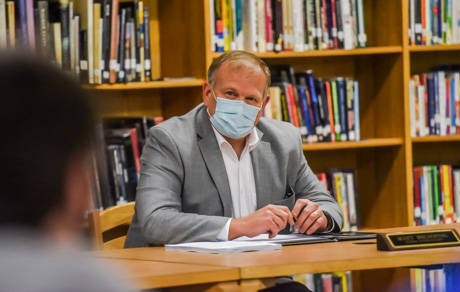Highlights from the Batavia City School District (BCSD) Board of Education meeting on Jan. 8 include news and updates about the following:
-
Security and Safety Procedures Review
-
Focus Update
-
Kindergarten Registration Begins Feb. 4
-
Curriculum Coordinator Hired
-
Budget Ambassadors Appointed
-
Richmond Memorial Library Updates Goals
-
Financial Summary Report
Security and Safety Procedures Reviewed
Superintendent of Schools Chris Dailey announced that an “Emergency Go Home Early Drill” will be held on Feb. 5 as part of the required State Safety Plan. All students will be released at 1:15 p.m. and off of school grounds by 1:30 p.m.
The BOE Safety Committee Chair Amy Barone reported that the committee met in December with Batavia City Police Chief Shawn Heubusch to review and discuss school safety. In addition to providing the district’s internal safety plan to the police department, the group discussed more police presence on school property (including both an increase in patrolling the grounds as well as having officers come inside buildings during extracurricular activities), police access to school buildings in a lock-down situation, the possibility of funding safety officer positions at schools, an increase in number and type of safety drills, and modifications to existing safety equipment and building design to increase safety functionality.
Election Day, which has been highlighted as a safety concern due to the schools being open to all voters on a day when children are present, was also discussed with proposals ranging from moving the election site off school grounds to scheduling a Superintendent’s Conference Day on voting days so that students would not be in the buildings.
Focus District Update
With two of his training sessions in Albany completed and another coming up in March, Superintendent Dailey reported that the district continues to move forward with meeting state requirements and criteria for the school improvement plan that identifies areas of need as well as programs and activities to help increase student achievement.
As one of the state’s requirements for the evaluation process is to work with non-district educational experts, Dailey noted that the district is fortunate to be working with Steve Uebbing, Ed.D., and Sandra Quinones, Ed.D., from the University of Rochester. They will meet with district administration and staff to help increase understanding of the six tenets of the state’s diagnostic process as well as to facilitate preparation for the state’s visits to the district and the middle school. The visit will take place in June.
In addition, bids are going out to approved vendors for the creation of surveys to solicit feedback from students, staff and parents. Overall, Dailey said, the process in very extensive and the district continues to make progress.
As noted at previous board meetings, the district did not meet New York State’s proficiency benchmarks in the 2010-2011 school year for one subgroup of students. As a result, it has been identified by the NYS Education Department as a Focus District, which is required to choose at least one school on which to focus efforts toward improvement for this subgroup.
Because the middle school has the greatest number of students in the specified subgroup, it was chosen as the Focus School. The district has assembled a school improvement committee to develop and implement a plan that identifies areas of need as well as programs and activities to help increase student achievement.
It’s important to note that the data used for the determination dates back to the 2010-2011 school year and if data from 2011-2012 had been used, the district would have made the target cut points. So while the district is responsible for following an approved Comprehensive Improvement Plan, many of the strategies and plans are already under way and yielding positive results.
Kindergarten Registration Begins Feb. 4
Superintendent Dailey announced that kindergarten registration for the 2013-2014 school year will take place Feb. 4-8 at Jackson Primary School in the multipurpose room.
Children who will be 5 years old on or before Dec. 1, 2013 are eligible to attend kindergarten in the fall. To register, parents are asked to go to Jackson primary on one of the designated school days between 9 a.m. and 3:30 p.m. and bring with them proof of residency such as a current utility bill or formal lease agreement, as well as the child’s birth certificate, Social Security card, and complete record of immunizations. Please note that no child can be registered without the required documentation.
Parents of new first-grade pupils are also asked to register their child in the same time frame and with the same documentation.
Jackson Primary School is located at 411 S. Jackson St. The office phone number is 343-2480, ext. 4000.
Curriculum Coordinator Hired
Superintendent Dailey announced that Curriculum Coordinator Jolene Dettman will begin work on Jan. 18. The position is shared with Pavilion Central School District. She comes from Monroe 2 where she developed expertise in the Common Core and in curriculum development.
Budget Ambassadors Appointed
Sherri Bartz, Rodney Brinkman, Frank DeMare, Jacquie Fowler, Michael Grammatico, Jay Gsell, Jill Halpin, Lynn Heintz, Patti Johnson, Cheryl Kowalik, Jason Molino, Marcia Riley, Durin Rogers, Richard Seymour, and Danielle Torcello applied and were appointed to be Budget Ambassadors for the 2013-2014 district budget proposal.
Ambassadors are residents of the district who volunteer and commit to serve on a committee which meets for two (2) two and a half (2.5) hour evening sessions. Ambassadors review the preliminary budget as developed by the administration (within parameters established by the Board of Education) and recommend to the board any modification(s) they would like to see. Their recommendations, while highly valued, are advisory rather than binding as the board develops the Proposed Budget to be brought to the voters. In addition, ambassadors agree to explain their work to any interested individual in the community.
Richmond Memorial Library Updates Goals
In addition to continuing to build on its previous goals related to space utilization, technology usage, working with the business community, and fiscal responsibility, the Richmond Memorial Library Board has approved goals for 2013-2017. Library Director Diana Wyrwa presented the revised mission statement and outlined the four goals.
The updated mission statement is “Richmond Memorial Library continually provides access to physical and virtual resources and services that meet the educational, informational, and recreational needs of its diverse community in a safe and comfortable environment.”
The four goals are:
1. Engage diverse populations with specific library programs and services.
2. Provide multifaceted resources and assistance for all ages to continue learning throughout their lives.
3. Act as a central source for information about and support of the wide variety of programs, services, and activities available to Batavia residents.
4. Provide ongoing economic stability for the library.
In addition, Wyrwa announced that, in 2014, the library will celebrate being open for 125 years. Plans are being made now to commemorate that event.
Financial Summary Report
Business Administrator Scott Rozanski reported on the November 2012 revenue and expenses for the district, reviewing them in comparison to the November 2011 figures.
Overall, the recorded revenues in the year-to-year comparison were fairly consistent, with an increase of $467,000 or slightly less than 2 percent. The most significant increases were recorded in Real Property Tax Levy and in state and federal aid. Real Property Tax Levy, which is counted as revenue when levied rather than when actually received, showed an increase of $355,000. State and federal aid showed an increase of $311,000, largely due to the state making its customary TRS (Teacher Retirement System) payments which the district is obliged to record as income.
Decreases in the “miscellaneous” category of $153,000 were largely due to BOCES refunds for both unused billed expenses as well as an increase in their state aid. In addition, the Non-property Tax Items category (utility tax) was down slightly more than $86,000. The utility tax, as has often been reported, experiences regular fluctuations and has been trending lower than last year.
Expenses were up by approximately $93,000 or slightly less than 1 percent, which was less than expected and primarily due to timing of payments in transportation.



